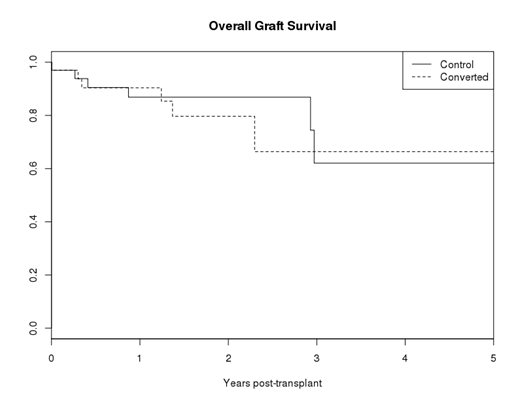Belatacept Conversion in Kidney Recipients with Low GFR Does Not Improve Renal Function.
1Transplant, Mayo Clinic, Scottsdale, AZ
2Biostatistics and Informatics, Mayo Clinic, Rochester, MN
Meeting: 2017 American Transplant Congress
Abstract number: 517
Keywords: Graft function, Graft survival, Immunosuppression
Session Information
Session Name: Concurrent Session: Kidney General Outcomes
Session Type: Concurrent Session
Date: Tuesday, May 2, 2017
Session Time: 4:30pm-6:00pm
 Presentation Time: 4:42pm-4:54pm
Presentation Time: 4:42pm-4:54pm
Location: E354a
Background:
Belatacept interferes with signal 2 of T cell activation via blockade CD80/86 which doesn't adversely impact renal function. We tested a hypothesis that Belatacept conversion might improve GFR in kidney transplant patients with low GFR. We used propensity matching to select the control group. To our knowledge this is the first study which compared the Belatacept recipients to a matched control cohort on tacrolimus regimen.Methods:Matched control single center retrospective study of all kidney recipients converted from CNI to Belatacept during period 1/2012-9/2016. Exclusion criteria: EBV negative and positive DSA (MFI>5000). Propensity matching for age, sex, race, KDPI, DGF, donor source, eGFR at conversion, baseline biopsy cv score and compared their outcomes 4 months post-conversion. Continuous data was tested via paired t-test. Categorical data was tested using McNemar's test. .Results:31 patients were converted from tacrolimus to Belatacept were compared to a paired matched control. There was no difference in the change of eGFR at 4 months in the bela and control group(see the table). There was no significant difference in rejection rate, denovo DSA and graft survival between the groups. Conclusions:. We found no evidence belatacept conversion improves eGFR 4 months after conversion in kidney transplant recipients with low eGFR.
| variable | belatacept | control | difference | p |
| time-0 GFR | 23.3±12.3 | 26.73±12.61 | -3.43(4) | 0.282 |
| 4-month GFR | 32.67±17.1 | 33.82±13.74 | -1.15(19) | 0.775 |
| age | 54.29(12.3) | 55.35(12.04) | -1.06(5) | 0.733 |
| gender (%) | 13(42) | 12(39) | 1(35) | 1 |
| Afro-American Recipient(%) | 2(6) | 1(3) | 1(3) | 1 |
| living donor(%) | 6(19) | 7(23) | 5(16) | 1 |
| acute rejection (%) | 6(20) | 6(20) | 6(20) | 1 |
| de novo DSA %) | 12(41) | 6(21) | 12(41) | 0.15 |
| dGFR | 9.07(14.45) | 6.91(9.89) | 2.16(18) | 0.5032 |
CITATION INFORMATION: Abdelwahab D, Byron S, Kaplan B, Heilman R. Belatacept Conversion in Kidney Recipients with Low GFR Does Not Improve Renal Function. Am J Transplant. 2017;17 (suppl 3).
To cite this abstract in AMA style:
Abdelwahab D, Byron S, Kaplan B, Heilman R. Belatacept Conversion in Kidney Recipients with Low GFR Does Not Improve Renal Function. [abstract]. Am J Transplant. 2017; 17 (suppl 3). https://atcmeetingabstracts.com/abstract/belatacept-conversion-in-kidney-recipients-with-low-gfr-does-not-improve-renal-function/. Accessed February 10, 2026.« Back to 2017 American Transplant Congress

